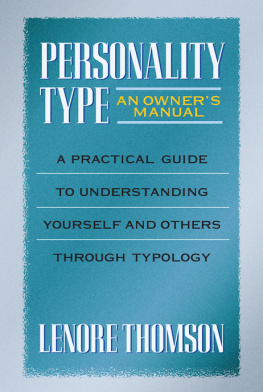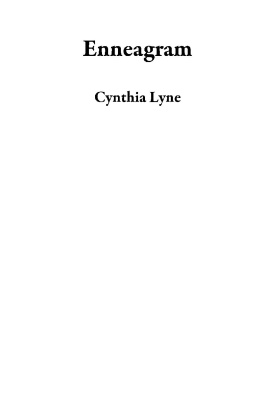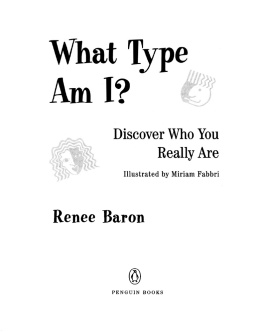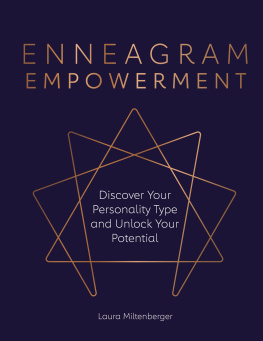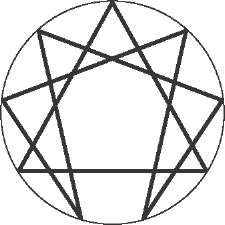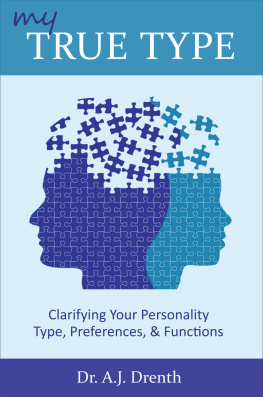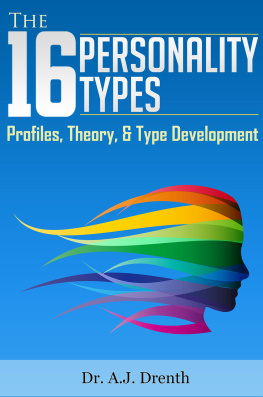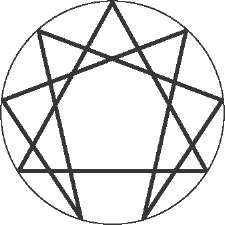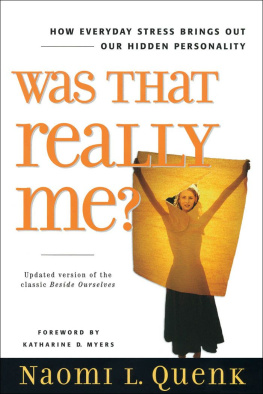ABOUT THE BOOK
The type test inside will tell you about the choices youve made and the direction youre takingaccording to C. G. Jungs theory of psychological types.
For Jung, knowing your type was essential to understanding yourself: a way to measure personal growth and change. But his ideas have been applied largely in the areas of career and marital counseling, so type has come to seem predictive: a way to determine your job skills and social abilities.
This book reclaims type as a way to talk about peoples inner potential and the choices they make in order to honor it. Using everyday examples from popular culturefilms, Star Trek, soap operas, comic stripsit describes the sixteen basic ways people come to terms with their gifts and values.
In this book you will find tools to understand:
- How your personality takes shape
- How your type reflects not only your current priorities, but your hidden potential
- How unlived possibilities are trying to get your attention
- How relationships at home and at work can help you to tap your unrealized gifts
Whether youre trying to figure out who you are and what you need to do in life, or recognizing that deeper meaning lies beyond what youve already accomplished, this book will help you to become aware of your greatest strengths, your opportunities to live them out, and your ability to make the most of your unique potential.
LENORE THOMSON, M.Div., has written extensively on theology and psychoanalysis for the past twenty-five years. Formerly managing editor of the Jungian journal Quadrant, she has taught courses on psychological types and popular culture at the C. G. Jung Foundation in New York City.
Sign up to learn more about our books and receive special offers from Shambhala Publications.

Or visit us online to sign up at shambhala.com/eshambhala.
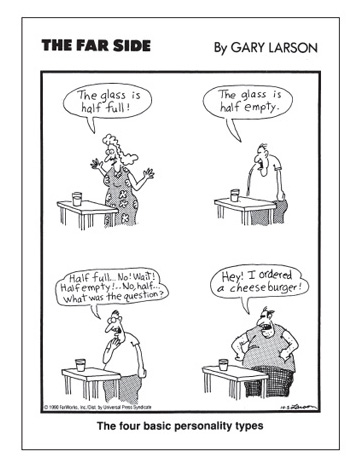
PERSONALITY TYPE
An Owners Manual
Lenore Thomson

SHAMBHALA
Boston & London
2014
Shambhala Publications, Inc.
Horticultural Hall
300 Massachusetts Avenue
Boston, Massachusetts 02115
www.shambhala.com
1998 by Lenore Thomson
Cover design by Jim Zaccaria
All rights reserved. No part of this book may be reproduced in any form or by any means, electronic or mechanical, including photocopying, recording, or by any information storage and retrieval system, without permission in writing from the publisher.
Library of Congress Cataloging-in-Publication Data
Thomson, Lenore.
Personality type: an owners manual/by Lenore Thomson.1st Shambhala ed.
p. cm.
eISBN 978-0-8348-2656-4
ISBN 978-0-87773-987-6 (pbk.: alk. paper)
1. Typology (Psychology) 2. Myers-Briggs Type Indicator.
I. Title.
BF698.3.T46 1998 9810700
155.2 64dc21 CIP
For my ESTJ father
who doubts that type means much of anything...
my INFP mother
who fervently hoped Id write a book on the Enneagram...
and my ENFP husband
who cant believe Id invest so much time in one project.
Contents
Over thirty years ago, C. A. Meier, one of the giants in the field of analytical psychology, delivered a provocative address at the Fourth International Congress for Analytical Psychology, in effect challenging his colleagues to administer psychological type tests to each of their patients. Of all the basic concepts of Jung, Meier declared, his notion of psychological type was not only the most neatly defined, but arguably the most important. Indeed, Meier suggested, perhaps membership in the International Association for Analytical Psychology ought to be limited to analysts who test their analysands at the start, during, and at the end of their analysis, as a way of determining whether or not Jungian therapy affected ones type.
For Meier, and Jung, understanding ones own type is the alpha and omega of the individuation process. Without this insight, one stands little chance of any true self-realization or development as an individual. Moreover, Meiers belief was that, since ones psychological type is not static, a shift must inevitably take place in order for any in-depth analytical work to be judged effective.
True to this challenge, Meier often administered the Myers-Briggs Type Inventory (MBTI) to those he worked withmyself included. While I am far from certain how much my own type shifted over the years, I have a profound respect for this aspect of Jungs thought, and I incorporate it into my own work with clientsboth as a therapist and as a business consultant. Indeed, Jungs typology is widely understood and valued for its practical applications in an almost unlimited range of fields. Mental health professionals, literary critics, sociologists, and career counselors, among others, relate to this unique concept of Jungian psychology, which is in fact quantifiable and measurable. From its function in the business world, to its insights in the humanities and in the helping professions, over the years such well known and highly respected authors, analysts, and scholars as Arnold Toynbee, Marie-Louise von Franz, and Thomas Moore, to name but a few, have written about and been interested in psychological type.
Nevertheless, the area where Jungs work on type has been most widespread is in the field of career and business consulting. The MBTI, developed almost fifty years ago by Isabel Briggs Myers and her mother, Katherine Briggs, is administered by personnel directors, career counselors, and business consultants, among others, to some two million individuals each year in the United States alone. In this context, the MBTI, along with other type tests such as the Gray-Wheelwright Psychological Type Questionnaire and the Singer-Loomis Inventory of Personality all owe their inspiration and conceptualization to Jungs groundbreaking work Psychological Types, first published in 1921. Lenore Thomson, in Personality Type: An Owners Manual, has continued this tradition for us by providing an in-depth yet easily understandable overview of what psychological type is all about on the cultural, collective, and personal levels.
Ms. Thomsons tour-de-force will remain a standard work for many years to come. This will come as no surprise to those who know her past work as managing editor of Quadrant: The Journal of Contemporary Jungian Thought. Additionally, as both acknowledged and unacknowledged editor of numerous books by highly regarded authors in the field of psychology today, she has garnered considerable respect over the years. Personally, having had the benefit of working with Lenore Thomson on a number of projects, including coauthoring with her the article In Search of the Essential John Lennon (on understanding the Beatles musician through the application of Jungs typology), I am pleased that her creative contributions to the field of psychological type will finally be available to the wider audience they deserve.
Notwithstanding the originality of Ms. Thomsons approach to type in general and this book in particular, I am pleased to have played some role in having her work see the light of day. A number of years ago, in response to a request to produce a psychological type quiz that would be self-scoring, accurate, easily taken, and computer-scored, I began developing such an instrument. First published in McCalls magazine in 1989, the Maidenbaum Personal Identity Test has been taken by well over five thousand individuals to date. Lenore Thomson was my editor on this project. With over twelve thousand lines of text, a myriad of different possible analyses based on the results of computer-generated responses, I could not have completed this project without her valuable input and suggestions.
Next page
